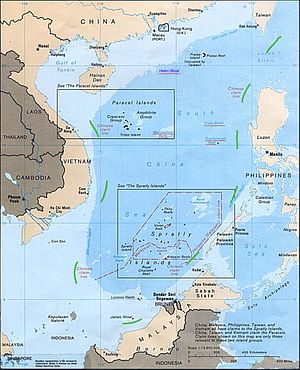As noted last week, the U.S. has lodged its objection to China’s “nine-dash-line” claim to the South China Sea. It is right to do so for two reasons.
First, in contrast to what China claims, the U.S. clearly stating its position on the conflict will reduce the chance that the U.S. and China will come to blows over the South China Sea.
From The Pacific Realist’s perch in Washington, DC, it always seemed obvious that the U.S. would not tolerate Beijing’s claims to almost the entire South China Sea, at least under the prevailing power dynamics in the region. Still, it’s easy to imagine how some in Beijing—particularly those most eager to enforce China’s gigantic claims—could come to a different conclusion on the matter. After all, Washington has stood by as the People’s Liberation Army has pushed the Philippines out of the Scarborough Shoal and continues to threaten the Second Thomas Shoal. It therefore doesn’t seem too far-fetched to believe that some in China would calculate that the U.S. will not stand up to Beijing in the South China Sea.
Directly challenging the legitimacy of China’s “nine-dash line” does carry some risks. In particular, although it’s likely to give China greater pause in pushing its claims in the South China Sea, it also puts the U.S. in a tough spot if China does decide to ignore America’s warning. That being said, the Obama administration has taken adequate measures to minimize this danger by stating that it would strengthen the U.S. military presence in Asia should Beijing cross certain red lines. Thus, while the U.S. has hardened its position, it has not put itself on a collision course with China.
The second and more important reason the U.S. is right in challenging China’s “nine-dash line” in the South China Sea is that Beijing’s claim is inherently destabilizing and not just for the Asia. China’s claim to 90 percent of the South China Sea is rooted primarily in the notion that past Chinese rulers have at times maintained sovereignty over the various islands and reefs in the waters. As a senior Chinese diplomat reportedly explained to U.S. officials back in 2008, “The dotted line of the South China Sea indicates the sovereignty of China over the islands in the South China Sea since ancient times.”
Allowing China to establish the principle that states can claim territory based on what their country has at times controlled would be disastrous for the simple reason that borders have been fluid throughout history. As a result, there would be a never-ending series of overlapping claims of sovereignty that would place countless states on a path to conflict.
Consider Europe, for example. The Ottoman Empire controlled large parts of Europe at various times, giving modern day Turkey the right to claim sovereignty over the continent. France and Germany could each claim sovereignty over most of Western and parts of Eastern Europe owing to the Napoleonic and Nazi Germany eras. The U.S. and England could claim much of Western Europe owing to the last few years of WWII. And Russia, of course, could demand that others recognize its dominance over all of Eastern Europe because of the Soviet Union’s borders. European states, in turn, could lay claim to much of the world thanks to the colonial era.
Ironically, few states would fare worse than China should its “nine-dash line” principle be upheld given how often parts of China have been invaded and occupied by outsiders. There is of course the 19th and early 20th century European colonial period when countries like Germany, France, and Great Britain laid claims to parts of China. Imperial Japan also controlled large sways of China giving Shinzo Abe the right to claim sovereignty over those parts of China. Even Mongolia could demand that its claim to sovereignty over China in its entirety be upheld because of the Mongol invasion and occupation of China in the 13th Century. Furthermore, much of modern day China has fallen outside the command of Chinese dynasties at various moments in time. For example, the Turkish people of Xinjiang province could claim that part of the People’s Republic of China on the grounds that it was part of Turkestan before the Qing Dynasty recaptured it.
All of this is to say that the principle behind China’s “nine-dash line” is dangerous for the general maintenance of peace and stability in the global system. The United States in particular, but all nations including China, would be derelict in their duties as nation-states to allow it to stand.
































